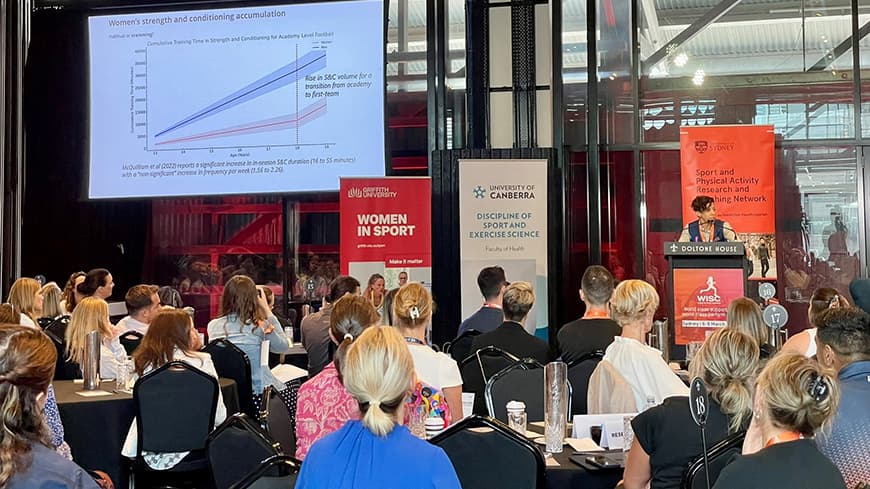Women athletes' health and performance are now a key topic among global scientific research, medical and sporting communities.
Edith Cowan University (ECU) and in particular, Pro-Vice-Chancellor (Sport) Professor Sophia Nimphius's recent national and international presentations are showing new leadership in this field.
In February, Professor Nimphius was invited to present at the FIFA Medical Conference 2024 held in Boston, USA.
The two-day conference is part of FIFA's objectives of uniting football medicine across the globe, promoting the development and implementation of high-quality scientific research and empowering FIFA Member Associations and confederations, to improve player health.
FIFA President Gianni Infantino opened the conference, speaking of the importance of the landmark gathering of internationals.
It was the first-time medical talent from all 211 FIFA Member Associations and the six confederations were brought together to shine a spotlight on the latest scientific developments with medical representatives.
In the session Popular myths in football – fact or fiction? ECU's Professor Nimphius spoke on the ACL epidemic among elite women footballers.
Anterior cruciate ligament (ACL) injury is a major knee injury in athletes participating in jumping, cutting, and pivoting sports.
Professor Nimphius questioned whether higher ACL injury rates are inherent for women, or did we create the disparity through suboptimal preparation?
"There is currently a higher rate of ACL in women footballers compared to male footballers, and I don't think it necessarily needs to be the case," she said.
"Statistics show that 61% of Strength and Conditioning coaches at women's academy level had less than five years of experience versus only 38% of men’s having this low level of coaching training.
"Additionally, although weightlifting is known for positively adapting the ACL, only 6% of women's academy coaches used weightlifting movements versus 30% of men's.
"The real question or myth we must bust is 'How do we "build" women footballers (and their ACLs)?'"
 Professor Sophia Nimphius delivered a keynote presentation at the Women in Sport Congress in Sydney.
Professor Sophia Nimphius delivered a keynote presentation at the Women in Sport Congress in Sydney.
Further to the focus on the health and performance of women athletes, Professor Nimphius also delivered a keynote presentation at the second Women in Sport Congress in Sydney, an event that hosted over 300 delegates from around the world.
The four-day event covered an array of topics related women's health and sport performance, which Professor Nimphius said could no longer just be accepted to be delivered at the levels they have been previously.
"Don't be okay with a lower standard for women. Challenge assumptions and expectations," Professor Nimphius said.
Find out more about the FIFA Medical Conference and the Women in Sport Congress.

 There is currently a higher rate of ACL in women footballers compared to male footballers.
There is currently a higher rate of ACL in women footballers compared to male footballers.



